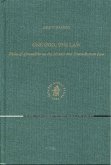The topic tackled in this book is Philo's account of the complex, double-sided nature of God's acting - the two-sided coin of God as transcendent yet immanent, unknowable yet revealed, immobile yet creating - and also the two sides of acting in humans - who, in an attempt to imitate God, both contemplate and produce. In both contexts, divine and human, Philo considers that it would not be proper to give precedence to either side - the result would be barren. God's acting and man's acting are at the same time both speculative and practical, and it is precisely out of this co-presence that the order of the world unfolds. Philo considers this two-sided condition as a source of complexity and fertility. Francesca Calabi argues that, far from being an irresolvable contradiction, Philo's two-fold vision is the key to understanding his works. It constitutes a richness that rejects reduction to apparently incompatible forms and aspects.
Hinweis: Dieser Artikel kann nur an eine deutsche Lieferadresse ausgeliefert werden.
Hinweis: Dieser Artikel kann nur an eine deutsche Lieferadresse ausgeliefert werden.








